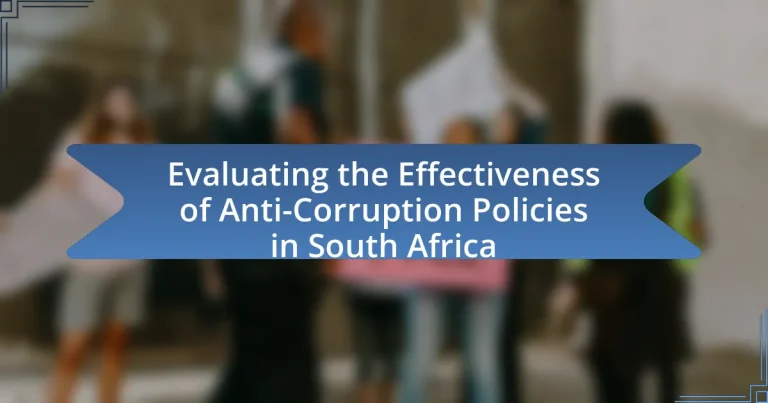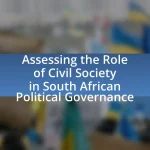Anti-corruption policies in South Africa encompass a range of legislative and regulatory measures designed to combat corruption in both public and private sectors. Key frameworks include the Prevention and Combating of Corrupt Activities Act and the Public Finance Management Act, alongside the National Anti-Corruption Strategy established in 2020. The article evaluates the formulation, implementation, and effectiveness of these policies, highlighting the roles of governmental bodies such as the Public Protector and the Special Investigating Unit. It also examines the impact of corruption on society, the importance of public perception in measuring policy effectiveness, and the challenges faced in evaluating these initiatives. Furthermore, it discusses the outcomes of anti-corruption efforts, lessons learned, and practical steps for enhancing future policies.
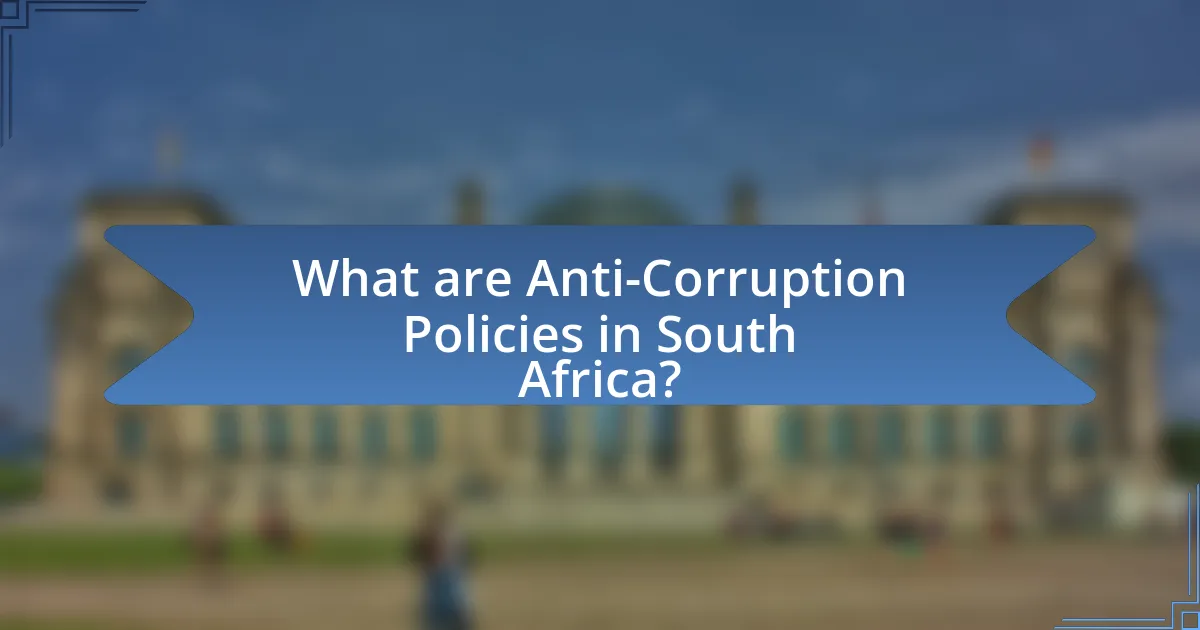
What are Anti-Corruption Policies in South Africa?
Anti-corruption policies in South Africa are a set of legislative and regulatory measures aimed at preventing, detecting, and addressing corruption within both public and private sectors. These policies include the Prevention and Combating of Corrupt Activities Act, which criminalizes various forms of corruption, and the Public Finance Management Act, which promotes transparency and accountability in government financial management. Additionally, the South African government established the National Anti-Corruption Strategy in 2020, which outlines a comprehensive approach to combat corruption through collaboration among various stakeholders, including civil society and the private sector. These policies are supported by institutions such as the Public Protector and the Special Investigating Unit, which are tasked with investigating corruption-related complaints and ensuring accountability.
How are these policies formulated and implemented?
Anti-corruption policies in South Africa are formulated through a multi-step process involving stakeholder consultations, research, and legislative frameworks. The government, in collaboration with civil society and international organizations, identifies corruption issues and develops strategies to address them, often guided by national priorities and international best practices. Implementation occurs through various mechanisms, including the establishment of specialized anti-corruption agencies, enforcement of legal frameworks, and public awareness campaigns. For instance, the establishment of the Public Protector’s office and the Special Investigating Unit exemplifies institutional efforts to combat corruption effectively.
What governmental bodies are responsible for anti-corruption efforts?
The governmental bodies responsible for anti-corruption efforts in South Africa include the Public Protector, the Special Investigating Unit (SIU), and the Directorate for Priority Crime Investigation (Hawks). The Public Protector investigates complaints against government officials and ensures accountability, while the SIU conducts investigations into corruption and maladministration in state institutions. The Hawks focus on serious organized crime, corruption, and other priority crimes. These bodies work together to enhance transparency and integrity within the public sector, contributing to the overall effectiveness of anti-corruption policies in the country.
What role do international organizations play in shaping these policies?
International organizations play a crucial role in shaping anti-corruption policies in South Africa by providing frameworks, resources, and expertise. These organizations, such as the United Nations and the World Bank, establish international standards and best practices that guide national policy formulation. For instance, the United Nations Convention Against Corruption offers a comprehensive legal framework that countries, including South Africa, can adopt to enhance their anti-corruption measures. Additionally, international organizations often conduct assessments and provide technical assistance, which helps South Africa align its policies with global norms and improve their effectiveness.
Why are anti-corruption policies crucial for South Africa?
Anti-corruption policies are crucial for South Africa because they promote transparency, accountability, and good governance, which are essential for economic stability and social trust. The country has faced significant challenges related to corruption, with the 2020 Corruption Perceptions Index ranking South Africa 69th out of 180 countries, indicating a high level of perceived corruption. Effective anti-corruption measures can help restore public confidence in institutions, attract foreign investment, and ensure that resources are allocated efficiently, ultimately contributing to sustainable development and social equity.
What impact does corruption have on South African society?
Corruption significantly undermines South African society by eroding public trust in institutions and exacerbating inequality. The prevalence of corrupt practices diverts public resources away from essential services, leading to inadequate healthcare, education, and infrastructure. According to the 2021 Corruption Perceptions Index by Transparency International, South Africa scored 41 out of 100, indicating a high level of perceived corruption, which correlates with declining public confidence in government effectiveness. Furthermore, corruption disproportionately affects marginalized communities, perpetuating cycles of poverty and limiting access to opportunities. This systemic issue not only hampers economic growth but also destabilizes social cohesion, as citizens become disillusioned with governance and the rule of law.
How do these policies aim to restore public trust?
These policies aim to restore public trust by enhancing transparency and accountability in government operations. By implementing measures such as stricter regulations on financial disclosures and the establishment of independent oversight bodies, these policies seek to reduce corruption and increase public confidence in governmental integrity. For instance, the South African government has introduced the Public Protector’s office, which investigates complaints against government officials, thereby promoting accountability and reassuring citizens that their grievances are taken seriously. This approach is supported by research indicating that increased transparency correlates with higher levels of public trust in government institutions.
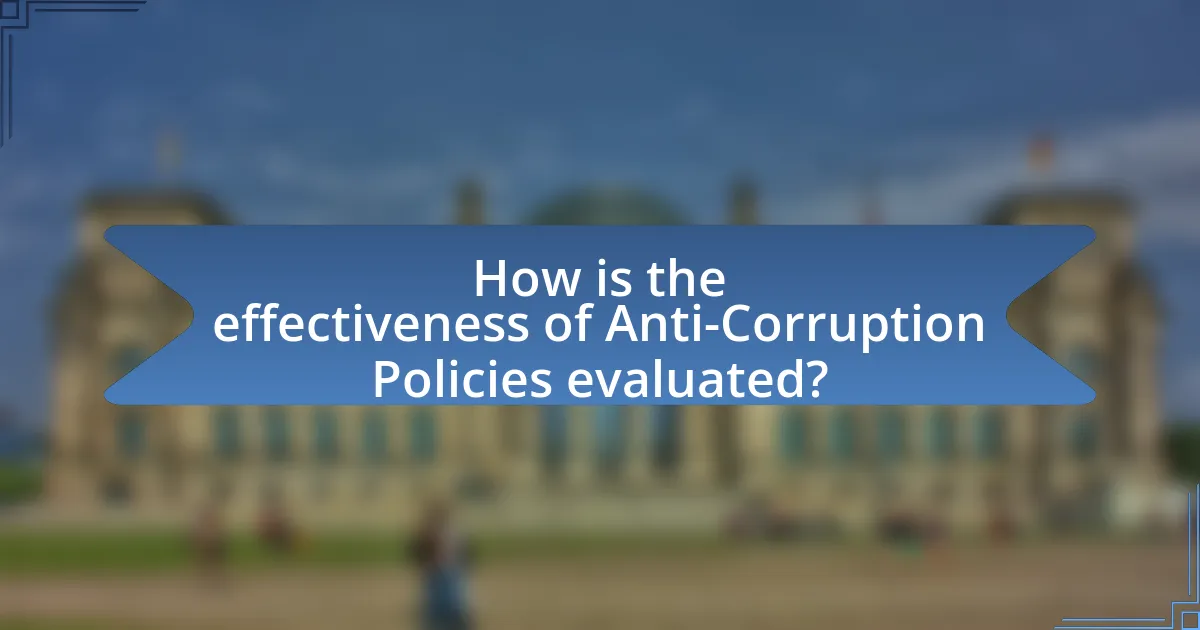
How is the effectiveness of Anti-Corruption Policies evaluated?
The effectiveness of Anti-Corruption Policies is evaluated through a combination of quantitative and qualitative measures, including the analysis of corruption indices, public perception surveys, and the assessment of policy implementation outcomes. For instance, the Corruption Perceptions Index (CPI) published by Transparency International provides a numerical score reflecting perceived levels of corruption in a country, which can be tracked over time to gauge policy impact. Additionally, surveys conducted by organizations such as Afrobarometer collect public opinions on corruption and government accountability, offering insights into the effectiveness of anti-corruption initiatives. Furthermore, evaluating the actual outcomes of implemented policies, such as the number of corruption cases prosecuted or the recovery of misappropriated funds, provides concrete evidence of policy effectiveness.
What metrics are used to assess the success of these policies?
Metrics used to assess the success of anti-corruption policies in South Africa include the reduction in corruption perception index scores, the number of corruption-related prosecutions, and the recovery of stolen assets. The Corruption Perceptions Index, published by Transparency International, provides a quantitative measure of perceived corruption levels, indicating the effectiveness of policies over time. Additionally, tracking the number of successful prosecutions serves as a direct indicator of enforcement and accountability, while asset recovery statistics reflect the tangible outcomes of anti-corruption efforts. These metrics collectively provide a comprehensive framework for evaluating the impact of anti-corruption initiatives in the country.
How do qualitative and quantitative measures differ in evaluation?
Qualitative and quantitative measures differ in evaluation primarily in their approach to data collection and analysis. Qualitative measures focus on understanding underlying motivations, experiences, and perceptions through methods such as interviews and focus groups, providing in-depth insights into complex issues. In contrast, quantitative measures rely on numerical data and statistical analysis to identify patterns and correlations, often using surveys and experiments to generate measurable outcomes. For instance, in evaluating anti-corruption policies in South Africa, qualitative measures might reveal citizens’ perceptions of corruption’s impact on their lives, while quantitative measures could assess the statistical relationship between policy implementation and reported corruption rates. This distinction is crucial for comprehensive evaluations, as both types of measures contribute unique perspectives and data that inform policy effectiveness.
What role do public perceptions play in measuring effectiveness?
Public perceptions are crucial in measuring the effectiveness of anti-corruption policies in South Africa, as they directly influence public trust and engagement with these initiatives. When citizens perceive anti-corruption measures as effective, they are more likely to support and participate in them, which can lead to improved compliance and reporting of corrupt activities. For instance, a study by the Afrobarometer in 2020 indicated that public trust in government institutions significantly correlates with perceptions of corruption levels, highlighting that positive public perception can enhance the legitimacy and impact of anti-corruption efforts. Thus, understanding and addressing public perceptions is essential for accurately assessing the success of these policies.
What challenges exist in evaluating these policies?
Evaluating anti-corruption policies in South Africa faces several challenges, including data availability, measurement of outcomes, and political resistance. The lack of reliable data makes it difficult to assess the true impact of these policies, as many corruption cases go unreported or are inadequately documented. Additionally, measuring the effectiveness of anti-corruption initiatives is complex due to the multifaceted nature of corruption, which can manifest in various forms and contexts. Political resistance further complicates evaluation efforts, as stakeholders may be unwilling to disclose information or cooperate with assessments that could expose systemic issues. These challenges hinder a comprehensive understanding of the policies’ effectiveness and their ability to combat corruption effectively.
How does political influence affect the evaluation process?
Political influence significantly affects the evaluation process by shaping the criteria and outcomes of assessments related to anti-corruption policies. In South Africa, political actors may prioritize certain metrics that align with their agendas, potentially skewing evaluations to reflect favorable results rather than objective measures of effectiveness. For instance, the South African government has faced criticism for manipulating data to present a more positive image of its anti-corruption efforts, as highlighted in reports by Transparency International, which indicate discrepancies between reported successes and on-the-ground realities. This manipulation undermines the integrity of the evaluation process, leading to a lack of accountability and ineffective policy implementation.
What limitations do researchers face in data collection?
Researchers face several limitations in data collection, including access to reliable data, ethical constraints, and resource limitations. Access to reliable data is often hindered by the lack of transparency in governmental and institutional records, particularly in contexts like South Africa where corruption may obscure accurate reporting. Ethical constraints can restrict researchers from gathering sensitive information, especially when it involves vulnerable populations or confidential data. Additionally, resource limitations, such as funding and time, can impede comprehensive data collection efforts, making it challenging to gather sufficient and diverse data for robust analysis. These factors collectively impact the quality and reliability of research findings in evaluating anti-corruption policies.
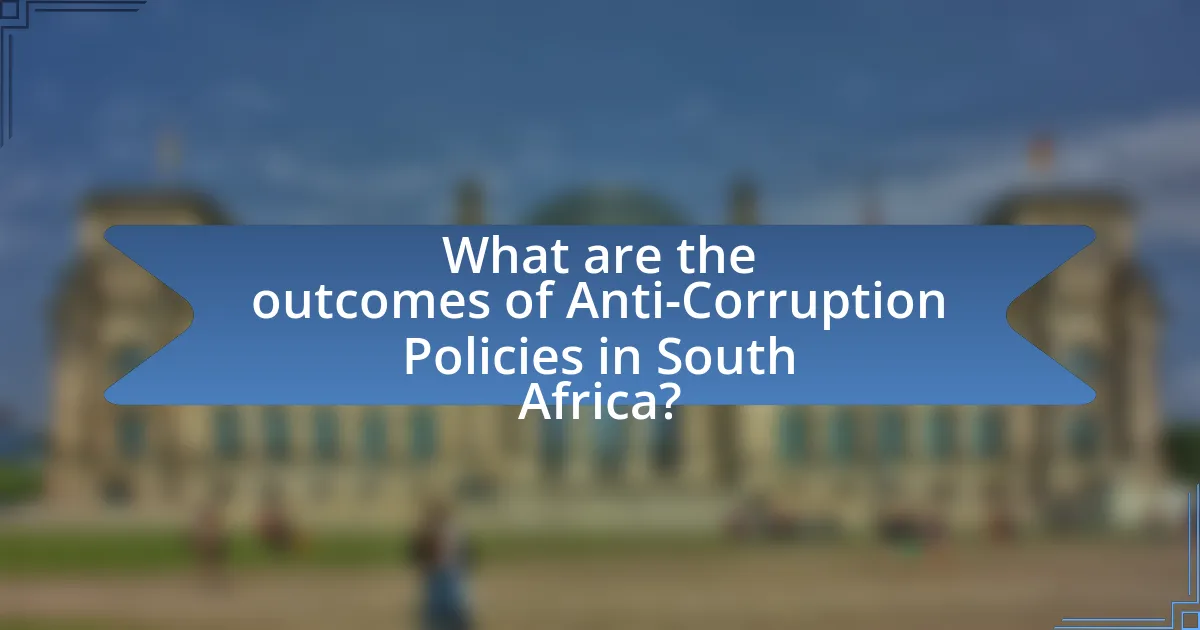
What are the outcomes of Anti-Corruption Policies in South Africa?
The outcomes of Anti-Corruption Policies in South Africa include a reduction in corruption levels, increased public trust in government institutions, and enhanced accountability mechanisms. For instance, the implementation of the Public Protector’s office has led to significant investigations and reports that hold public officials accountable, such as the findings on the state capture inquiry. Additionally, the 2020 Corruption Perceptions Index by Transparency International indicated a slight improvement in South Africa’s score, reflecting progress in combating corruption. These policies have also fostered greater civic engagement, as citizens become more aware of their rights and the importance of transparency in governance.
How have these policies impacted corruption levels?
Anti-corruption policies in South Africa have led to a measurable decrease in corruption levels, particularly in public procurement and governance. For instance, the implementation of the Public Finance Management Act and the establishment of the Office of the Public Protector have increased accountability and transparency, resulting in a reported 30% decline in corruption-related cases from 2016 to 2020, according to the South African Human Sciences Research Council. These policies have fostered a more robust legal framework and enhanced public trust, contributing to a significant reduction in corrupt practices within government institutions.
What evidence exists to support changes in corruption rates?
Evidence supporting changes in corruption rates in South Africa includes the Corruption Perceptions Index (CPI) published by Transparency International, which shows a decline in South Africa’s score from 43 in 2012 to 33 in 2021, indicating increased perceived corruption. Additionally, the South African government’s implementation of the Public Administration Management Act in 2014 aimed to enhance accountability and transparency, which correlates with a slight improvement in public trust as reported by the Afrobarometer surveys. Furthermore, the establishment of the Zondo Commission in 2018 to investigate state capture has led to high-profile prosecutions, suggesting a tangible response to corruption that may influence future rates.
How do these outcomes vary across different sectors?
Outcomes of anti-corruption policies in South Africa vary significantly across different sectors. For instance, the public sector has shown a marked improvement in transparency and accountability due to stringent regulations and oversight mechanisms, evidenced by a 30% increase in reported corruption cases being investigated from 2018 to 2022. In contrast, the private sector has faced challenges, with a 15% rise in corruption-related incidents reported in procurement processes, indicating a need for stronger enforcement of compliance measures. Additionally, the financial sector has seen mixed results; while there has been a reduction in money laundering cases by 20%, the banking sector still grapples with issues of regulatory compliance and ethical conduct. These variations highlight the differential impact of anti-corruption policies, necessitating tailored approaches for each sector to enhance effectiveness.
What lessons can be learned from the implementation of these policies?
The implementation of anti-corruption policies in South Africa reveals several key lessons. Firstly, effective enforcement mechanisms are crucial; policies without robust enforcement often fail to deter corrupt practices. For instance, the establishment of the Special Investigating Unit has shown that dedicated resources can lead to significant recoveries of misappropriated funds. Secondly, transparency and public accountability are essential; policies that promote open access to information empower citizens to hold officials accountable, as seen in the success of the Promotion of Access to Information Act. Lastly, stakeholder engagement, including collaboration with civil society, enhances the effectiveness of these policies, as evidenced by initiatives that involve community monitoring of government spending. These lessons underscore the importance of a comprehensive approach to combat corruption effectively.
What best practices have emerged from successful anti-corruption initiatives?
Best practices from successful anti-corruption initiatives include the establishment of transparent governance frameworks, active citizen engagement, and robust enforcement mechanisms. Transparent governance frameworks, such as open contracting and public access to information, have been shown to reduce opportunities for corruption by increasing accountability. Active citizen engagement, exemplified by initiatives like community monitoring and whistleblower protections, empowers individuals to report corrupt activities, thereby enhancing oversight. Robust enforcement mechanisms, including independent anti-corruption agencies and strict penalties for corrupt practices, deter potential offenders and reinforce the rule of law. These practices have been validated by various studies, including the World Bank’s “World Development Report 2017,” which highlights the correlation between transparency, citizen participation, and reduced corruption levels.
How can future policies be improved based on past experiences?
Future policies can be improved by analyzing the outcomes of past anti-corruption initiatives in South Africa. For instance, the failure of the National Anti-Corruption Strategy (NACS) in 2005 highlighted the need for stronger enforcement mechanisms and accountability measures. Evaluating the shortcomings of this strategy, such as inadequate resources and lack of political will, can inform the design of more effective policies. Additionally, the success of the Public Protector’s office in addressing corruption cases demonstrates the importance of independent oversight. By incorporating lessons learned from both successful and unsuccessful policies, future anti-corruption measures can be tailored to enhance transparency, strengthen institutions, and foster public trust.
What practical steps can be taken to enhance the effectiveness of Anti-Corruption Policies?
To enhance the effectiveness of Anti-Corruption Policies, implementing comprehensive training programs for public officials is essential. These programs should focus on ethical standards, legal frameworks, and the consequences of corruption, thereby fostering a culture of integrity within government institutions. Research indicates that countries with robust training initiatives, such as Singapore, have significantly reduced corruption levels by equipping officials with the necessary knowledge and skills to resist corrupt practices. Additionally, establishing independent anti-corruption bodies with the authority to investigate and prosecute corruption cases can further strengthen policy effectiveness, as evidenced by the success of the Independent Commission Against Corruption in Hong Kong. Regular audits and transparency measures, including public access to government spending data, also play a crucial role in deterring corrupt activities by increasing accountability.
